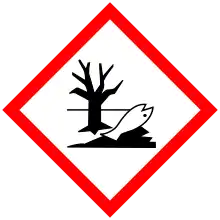 | |
| Names | |
|---|---|
| Preferred IUPAC name
N′-[4-(4-Chlorophenoxy)phenyl]-N,N-dimethylurea | |
| Other names
3-[4-(4-Chlorophenoxy)phenyl]-1,1-dimethylurea | |
| Identifiers | |
3D model (JSmol) |
|
| ChEBI | |
| ChemSpider | |
| ECHA InfoCard | 100.016.222 |
| EC Number |
|
| KEGG | |
PubChem CID |
|
| UNII | |
| UN number | 3077, 2767 |
CompTox Dashboard (EPA) |
|
| |
| |
| Properties | |
| C15H15ClN2O2 | |
| Molar mass | 290.745 g mol−1 |
| Appearance | solid |
| Density | 1.27 g/cm3 |
| Melting point | 151 °C |
| Hazards | |
| GHS labelling: | |
  | |
| Warning | |
| H332, H400 | |
| P261, P271, P273, P304+P312, P304+P340, P312, P391, P501 | |
| Flash point | 231.6 °C (448.9 °F; 504.8 K) |
Except where otherwise noted, data are given for materials in their standard state (at 25 °C [77 °F], 100 kPa).
Infobox references | |
Chloroxuron is an organic compound with the chemical formula C15H15ClN2O2 used as an herbicide. It is classified as an extremely hazardous substance in the United States as defined in Section 302 of the U.S. Emergency Planning and Community Right-to-Know Act (42 U.S.C. 11002), and is subject to strict reporting requirements by facilities which produce, store, or use it in significant quantities.[1]
References
- ↑ "40 C.F.R.: Appendix A to Part 355—The List of Extremely Hazardous Substances and Their Threshold Planning Quantities" (PDF) (July 1, 2008 ed.). Government Printing Office. Archived from the original (PDF) on February 25, 2012. Retrieved October 29, 2011.
{{cite journal}}: Cite journal requires|journal=(help)
This article is issued from Wikipedia. The text is licensed under Creative Commons - Attribution - Sharealike. Additional terms may apply for the media files.